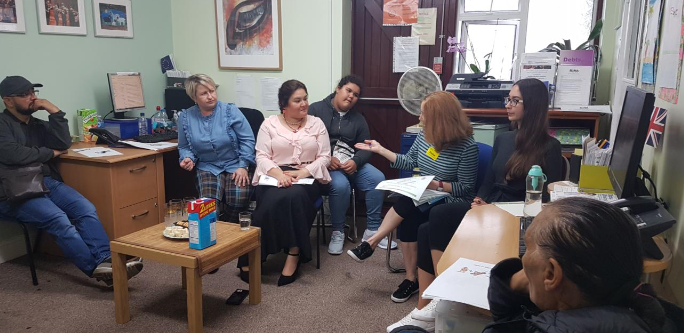Contents
- Lifestyle related illnesses and hypertension
- Cancer
- Mental health
- Immunisation
- Maternity services
- Children and young people
- Rough sleepers and homeless community members
- Introduction to the Roma health guide
- Barriers to healthcare for the Roma community
- System barriers
- Language barriers and communication
- Cultural barriers - Common health problems and vulnerable groups:
- Lifestyle related illnesses and hypertension
- Cancer
- Mental health
- Immunisation
- Maternity services
- Children and young people
- Rough sleepers and homeless community members
Introduction to the Roma health guide
Roma Support Group has developed a guide to help health and care professionals better understand health inequalities and barriers to accessing healthcare for the Roma community in the UK, take action to improve services and build a relationship with the community. The guide provides actionable suggestions for good practice, developed with partners in the Health and Wellbeing Alliance, and focuses on practical action for frontline health practitioners, team leaders and commissioners working with Roma communities.
General and specialist advice for health professionals
The Roma Health Guide consists of two parts intended to supplement each other: this version recommends actions for specialist practitioners or health professionals working with Roma community members with particular healthcare needs, such as children or rough sleepers.
A generalist version of the guide at recommends a set of broadly applicable actions for frontline health practitioners, team leaders and local commissioners seeking to remove barriers to care for the Roma community as a whole. The generalist guide also provides relevant context on Roma culture, language and history and how experiencing social exclusion can affect health, and outlines common barriers to accessing healthcare experienced by Roma patients.
The Roma community and access to healthcare
Roma Support Group is based in East London, advising the local East European Roma community and supporting the more socially excluded community members. Be aware that not all Roma people will have the same problems in accessing healthcare: Roma from different countries of origin, age groups and more or less traditional communities will differ in their needs and levels of exclusion they experience. There are many educated and empowered Roma, particularly among younger generations or those living many years in the UK, who will not necessarily have the difficulties we describe.
General and specialist advice for health professionals
The Roma Health Guide consists of two parts intended to supplement each other: this version recommends actions for specialist practitioners or health professionals working with Roma community members with particular healthcare needs, such as children or rough sleepers.
A generalist version of the guide at recommends a set of broadly applicable actions for frontline health practitioners, team leaders and local commissioners seeking to remove barriers to care for the Roma community as a whole. The generalist guide also provides relevant context on Roma culture, language and history and how experiencing social exclusion can affect health, and outlines common barriers to accessing healthcare experienced by Roma patients.
The Roma community and access to healthcare
Roma Support Group is based in East London, advising the local East European Roma community and supporting the more socially excluded community members. Be aware that not all Roma people will have the same problems in accessing healthcare: Roma from different countries of origin, age groups and more or less traditional communities will differ in their needs and levels of exclusion they experience. There are many educated and empowered Roma, particularly among younger generations or those living many years in the UK, who will not necessarily have the difficulties we describe.
<-- Previous page:
- No previous page




